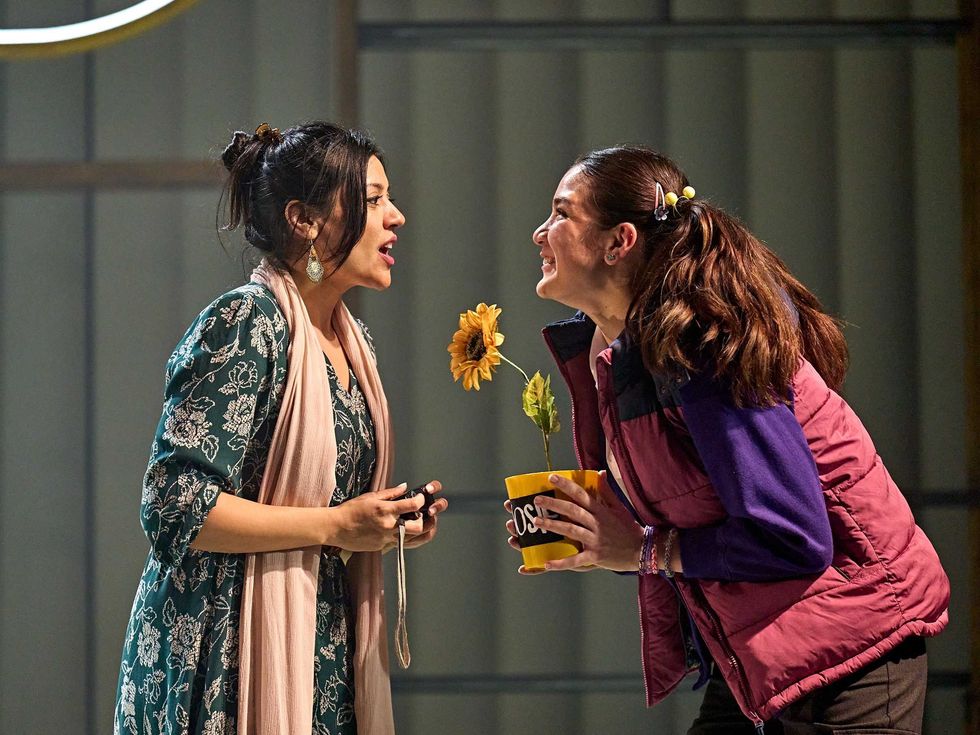BEING surrounded by music and films from an early age pushed Priya Davdra towards a career in acting.
The versatile British Asian performer has found success across multiple platforms, including being a regular on the iconic soap EastEnders, starring in the Indian film, Naan Yaar, and acting in the TV show, Count Abdullah. Earlier this month, she embarked on her first national theatre tour with the new stage production, The Boy at the Back of the Class.
The stage adaptation of a best-selling novel by Onjali Q Raúf opened at the Rose Theatre in Kingston and will be performed in various cities until June. The timely, humorous and heartwarming story revolves around a child refugee who has fled a war-torn country and an audacious plan hatched by his young classmates to help him reunite with his parents.
The actress has two roles in the play which is aimed at audiences of all ages. In an interview with Eastern Eye, Davdra discussed her roles, acting, theatre and journey so far.
What was it that initially drew you to the world of acting?
Growing up, Indian cinema was prominent in my family. I was always surrounded by music, films and songs, which played a huge part in my life from a young age. My dad loved to sing and my mum was always dancing to whatever was playing on the radio, which was a huge influence on me as a child.
Tell us more about that.
I remember watching Bollywood films at home and acting out scenes and dances from the films, making my family watch every second of my performance (unfortunately for them). As I grew older, my interest in British television and film only increased and I loved watching these nuanced performances, which totally blew me away. I was so inspired and enchanted, watching actors create a world where anything and everything was possible.
Tell us about your new play, The Boy at the Back of the Class.
It is based on a very popular novel written by Onjali Q Rauf and has been adapted for the stage by Nick Ahad and has been directed by the fabulous Monique Touko. It’s a beautiful story about a refugee boy, his journey and him finding a voice in a society and environment that can have stereotypical and prejudiced views on refugees. The play focuses on the power of kindness in a sometimes complicated and not-so-simple world. It’s a wonderful adaptation that will make you chuckle, tear up and everything in between.
Tell us about the characters you portray.
I play both the mum and Mrs Khan. Mum works in a library and is a kind, sympathetic and thoughtful character. She lives for her daughter (Alexa) and it’s them against the world. Mum believes that everything can be fixed through the power of kindness and even though there are moments where kindness seems like the least attractive option, it is the way of life she wants her daughter to live by. While fighting her own battles, she will never let her mask slip for the sake of her daughter’s happiness.
What about your other character?
Mrs Khan, on the other hand, while loved by the children she teaches, is authoritative, dynamic, strong, feisty and, according to her class, very cool.
What do you most love about this version?
The beauty of this adaptation is that while it retains the essence of the original novel, every actor has brought something exciting and individualistic to the performance. Children and adults who have read the book will be able to recognise each character, but also appreciate the intricate, subtle and exciting additions the production brings.
Which audiences do you hope will connect with this production?
This play is for the masses. While based on a popular children’s novel, its message resonates deeply with people of all ages, making it universally meaningful.
What is that key message?
Kindness is the main takeaway for me from the play. The story encourages everyone to really think about what it means to be a good and kind person, especially to those who face struggles and challenges. This is something which we sometimes do not quite appreciate, nor truly understand.
How do these roles compare to others you have done so far?
This is my first professional UK touring stage production, so that in itself is a huge change from what I’ve experienced before. Playing two different characters is exciting and provides a real challenge in ensuring both have unique qualities that separate them and stand alone in their own right. It’s a challenge I am really looking forward to taking on.
Which character, out of the ones you have played, is closest to your heart?
The mum’s character I am portraying in the current play feels the closest. Mum has a very teasing, easygoing type of relationship with her daughter, Alexa, and there are moments in this play where I channel into that the relationship I have with my own mother. It was important for me to make this character as authentic as possible and the best way to do that was to relive and revisit special moments that I had shared with my mum.

How does acting for television compare to performing on stage?
They both have certain similarities and differences. The prep and character work you do is essential in both. However, I find screen acting can be a little more nuanced, mainly because the camera is so close. This means that every emotion and thought is captured truthfully by the lens.
What about theatre?
In theatre, I find everything needs to be a little more expressive with voice, body movement and command of the stage, so the audience can follow you throughout your journey. It’s connecting with the audience in real time, which plays a critical part in how different these two can be.
There are no second takes in theatre, unlike screen acting and no two performances on stage are ever going to be exactly the same.
What is the secret of a great performance?
(Smiles) Don’t perform; just be. For me, it’s as simple as that.
Tell us, what makes for good theatre?
I love the theatre. For me, it’s the compelling storytelling and thought-provoking themes which make great theatre. A performance that makes you feel a range of emotions and completely forget that you’re sitting in an auditorium filled with other people. Lighting, sound and costumes also add to creating an unforgettable experience.
Why should we all come to watch The Boy at the Back of the Class?
It’s a story every child and adult should experience. The messages it conveys is of such importance, especially in this day and age. Everyone will take something positive away from it. It will stay with you for a long time.
The Boy at the Back of the Class tour dates: Rose Theatre, Kingston (Until February 22); Festival Theatre, Chichester (February 27 – March 1); Lyceum Theatre, Sheffield (March 5-9); Arts Theatre, Cambridge (March 12-16); Festival Theatre, Malvern (March 19-23); The Lowry, Salford (March 26-30); Grand Theatre, Wolverhampton (April 16-20); Theatre Royal, Norwich (April 23-27); Theatre Royal, Newcastle (April 30 – May 4); Grand Theatre, Blackpool (May 7-11); Belgrade Theatre, Coventry (May 14-18); The Marlowe, Canterbury (May 22-25); Lighthouse, Poole (May 28-June 1); Curve Theatre, Leicester (June 4-8)




